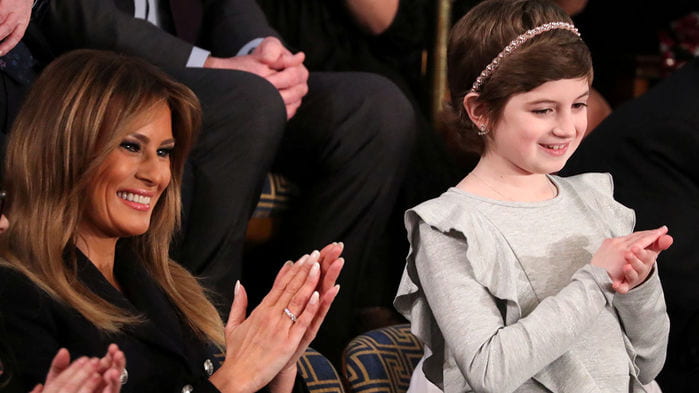Feb 27, 2019
Jocelyn Kaiser
President Donald Trump’s proposal in his State of the Union address earlier this month to spend $500 million over 10 years on pediatric cancer research will begin in 2020 with a focus on sharing patients’ data, federal officials say. That plan is getting a mixed response from researchers and patient advocates, who also worry that the initiative will come at expense of other parts of the National Cancer Institute’s (NCI’s) budget.
During his speech, Trump described a “very brave” guest sitting with first lady Melania Trump—10-year-old brain cancer survivor Grace Eline, who raised funds for pediatric cancer research before developing the disease herself. “Many childhood cancers have not seen new therapies in decades. My budget will ask the Congress for $500 million over the next 10 years to fund this critical life-saving research,” Trump said. A $50-million-a-year boost would mean an 11% increase over the $462 million that NCI and other National Institutes of Health (NIH) institutes expect to spend this year on pediatric cancer. (In contrast, Trump administration officials have warned that they expect to issue a budget request to Congress next month that calls for an overall 5% cut to nondefense spending in the 2020 fiscal year that begins 1 October.)
The Trump announcement came as a surprise to staff at NCI and cancer patient groups. NCI officials say details are still being worked out. But during a conference call with researchers and advocates on 14 February, NCI Director Ned Sharpless in Bethesda, Maryland, who has made “big data” part of his agenda, said data sharing will be a major initial thrust of the initiative. An NCI spokesperson explains to ScienceInsider that $50 million in 2020 “would afford a unique opportunity to leverage the power of existing data and develop new knowledge that will drive discovery and development of new approaches to treat childhood cancers.”
That’s welcome news to University of California, Santa Cruz, genomics researcher Olena Morozova Vaske, who with David Haussler runs a pediatric cancer genome project. She and Haussler say that because pediatric cancers are very rare, it’s crucial to combine patient data from academic and industry clinical trials as well as international patients. That will take implementing new standards and building new digital infrastructure. Existing databases “need to all be talking to each other so we can consolidate data,” Vaske says. “You really have to make sure you’re capturing information from every single patient.”
[ Read more ]


Recent Comments